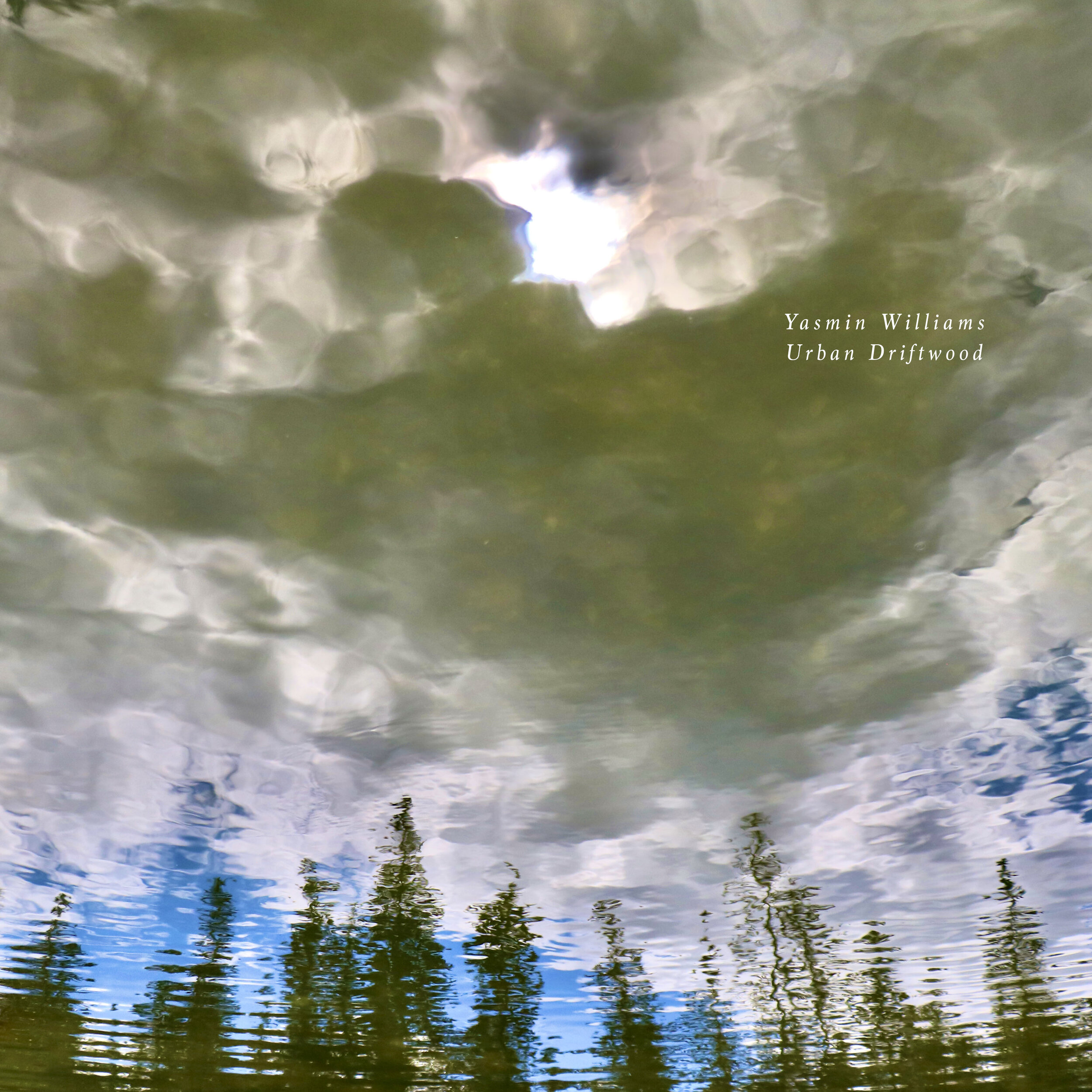Yasmin Williams
Urban Driftwood
Yasmin Williams sits on her leather couch, her guitar stretched across her lap horizontally with its strings turned to the sky. She taps on the fretboard with her left hand as her right hand plucks a kalimba placed on the guitar’s body. Her feet, clad in tap shoes, keep rhythm on a mic’d wooden board placed under her. Even with all limbs in play, it’s mind boggling that the melodic and percussive sounds that emerge are made by just one musician, playing in real time. With her ambidextrous and pedidextrous, multi-instrumental techniques of her own making and influences ranging from video games to West African griots subverting the predominantly white male canon of fingerstyle guitar, Yasmin Williams is truly a guitarist for the new century. So too is her stunning sophomore release, Urban Driftwood, an album for and of these times. Though the record is instrumental, its songs follow a narrative arc of 2020, illustrating both a personal journey and a national reckoning, through Williams’ evocative, lyrical compositions.
A native of northern Virginia, Williams, now 24, began playing electric guitar in 8th grade, after she beat the video game Guitar Hero 2 on expert level. Initially inspired by Jimi Hendrix and other shredders she was familiar with through the game, she quickly moved on to acoustic guitar, finding that it allowed her to combine fingerstyle techniques with the lap-tapping she had developed through Guitar Hero, as well as perform as a solo artist. By 10th grade, she had released an EP of songs of her own composition. Deriving no lineage from “American primitive” and rejecting the problematic connotations of the term, Williams’ influences include the smooth jazz and R&B she listened to growing up, Hendrix and Nirvana, go-go and hip-hop. Her love for the band Earth, Wind and Fire prompted her to incorporate the kalimba into her songwriting, and more recently, she’s drawn inspiration from other Black women guitarists such as Elizabeth Cotten, Sister Rosetta Tharpe, and Algia Mae Hinton. On Urban Driftwood, Williams references the music of West African griots through the inclusion of kora (which she recently learned) and by featuring the hand drumming of 150th generation djeli of the Kouyate family, Amadou Kouyate, on the title track.
“Yasmin Williams truly is a guitarist for a new century. Unburdened by canonic lineage or stylistic convention, Williams has discovered a way of playing that is wholly her own. The ten tracks on Urban Driftwood lay down a dense blanket of polyrhythm and deft technical ability, a woven patchwork of microtonal ruminations that express the emotions of an artist's soul through her instrument. Williams' harp guitar, acoustic guitar, kalimba, and kora blend seamlessly together, bringing subtle variation from track to track, highlighted at times by cello, djembe and cadjembe. Lush and emotive, Urban Driftwood brings fresh invention and creativity to the fingerstyle guitar genre, showcasing a truly modern spirit that is sure to inspire.” -Daniel Bachman
Yasmin Williams is virtuosic in her mastery of the guitar and in the techniques of her own invention, but her playing never sacrifices lyricism, melody, and rhythm for pure demonstration of skill. As she said in an interview on New Sounds’ Soundcheck podcast, “The songwriting process drives the techniques. I don’t use techniques that aren’t needed.” Storytelling through sound is important to her too. As detailed in the liner notes, the songs on Urban Driftwood were completed during the COVID-19 pandemic and subsequent lockdown, in the midst of a national uprising of Black Lives Matter protests in response to the killing of George Floyd and Breonna Taylor. The sequencing on the record intends to illustrate the unfolding of these events, beginning with album opener “Sunshowers,” with its rich texture of hammer-ons on pull-offs expressing innocence and collective excitement for a new year and decade, swiftly moving to the more contemplative speculation of “I Wonder” and the self-reflective “Juvenescence,” with its Bridget St. John-reminiscent opening and descending and ascending arpeggios throughout. On “Adrift,” the first track on Side B, Yasmin’s guitar engages in a call-and-response fugue with cello, played by Taryn Wood, emulating the political unrest, chaos, and floundering of the country as it reckoned with the persistence of white supremacy and vast inequality.
The narrative plot of Urban Driftwood culminates in the repetitive, meditative sounds of guitar, kora, kalimba, and hand drums on the penultimate title track, creating a sonic landscape that communicates the feeling of movement and evokes images of the natural beauty that persists within urban spaces. As she wrote the song, Williams was reflecting on her personal role in the context of the current societal moment, considering her position as Black female guitarist within a white male dominated field. Yasmin says, “There are not many Black guitarists within this genre and particularly with all of the political and social discord that was/is happening in the United States in 2020, I felt it was extremely important to include a song on the album that was inspired by my heritage and paid homage to who I am, the household I grew up in, the music I listened to as a child. ‘Urban Driftwood’ is more like the music I grew up listening to than any other song I’ve released so far.” The record concludes with the emotional, “After the Storm,” questioning the path ahead while embracing a sense of peace through its interwoven guitar parts. The track is a fitting denouement for this album, that while it illustrates current struggle, can’t help but open-heartedly offer a timeless solace.
Selected Press for Urban Driftwood:
“Williams, 25, is one of the country’s most imaginative young solo guitarists. Released in January, her second album, Urban Driftwood, represents a clear break with the form’s stoic, folk-rooted mores." -Grayson Haver Currin, The New York Times
"Above all, 'Urban Driftwood' is her challenge to widespread preconceptions about the music made by young Black people or acoustic guitarists. It’s Williams’s achievement that she makes that challenge sound so calming and beautiful." -John Lingan, The Washington Post
"Part of the thrill of Urban Driftwood is how untethered Williams sounds to any tradition whatsoever: She has a gift for penning melodies that feel as catchy as pop songs, as in the lightly descending refrain of 'Juvenescence,' but her approach to the instrument also allows her to confound expectations, making you question the source of each overtone and rhythm." -Sam Sodomsky, Pitchfork
“When 24-year-old instrumentalist Yasmin Williams plays guitar, she conjures new possibilities and stories from the instrument.” -Jonathan Bernstein, Rolling Stone
"Williams is all the things that finger-picked guitar usually isn’t – young, female, Black, digitally native, unabashed by tradition and open to all sorts of multicultural influences. She’s a fresh breeze blowing through a sometimes musty corner of music, and let’s just say it again, a little bit of sunshine, too." ️ -Jennifer Kelly, Dusted
Urban Driftwood Tracklist:
Side A (21 minutes)
Sunshowers (4:14)
I Wonder (Song for Michael) (5:23)
Juvenescence (3:50)
Dragonfly (4:43)
Swift Breeze (3:01
Side B (24 minutes)
Adrift (ft. Taryn Wood) (4:35)
Through the Woods (5:19)
Jarabi (3:33)
Urban Driftwood (ft. Amadou Kouyate) (5:01)
After the Storm (5:42)
Urban Driftwood Credits:
Urban Driftwood was engineered and mixed by Jeff Gruber at Blue House Productions in Kensington and Silver Spring, Maryland and mastered by Charlie Pilzer at Tonal Park Studios in Takoma Park, Maryland.
All songs composed and performed by Yasmin Williams, with additional performances by Taryn Wood (cello) and Amadou Kouyate (djembe and cadjembe). Williams is sponsored by GHS Strings, Shubb Capos, Skytop Guitars, Timberline Guitars, and Black Mountain Picks.
Official video for the title track of Yasmin Williams' Urban Driftwood
Directed by Drew Hagelin
Camera Operation by Drew Hagelin & Josh Vaile
Appearances by Yasmin Williams & Amadou Kouyate


